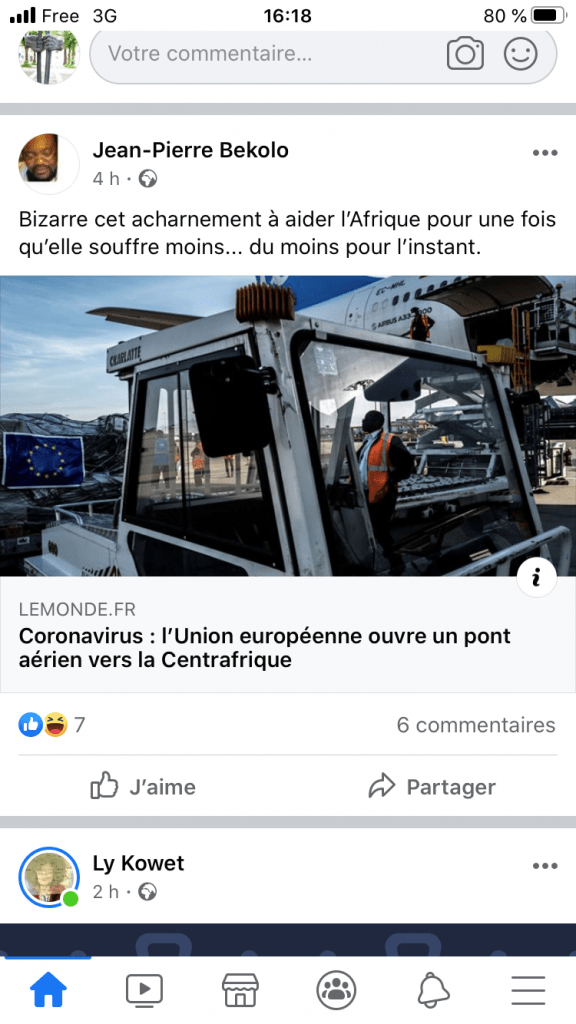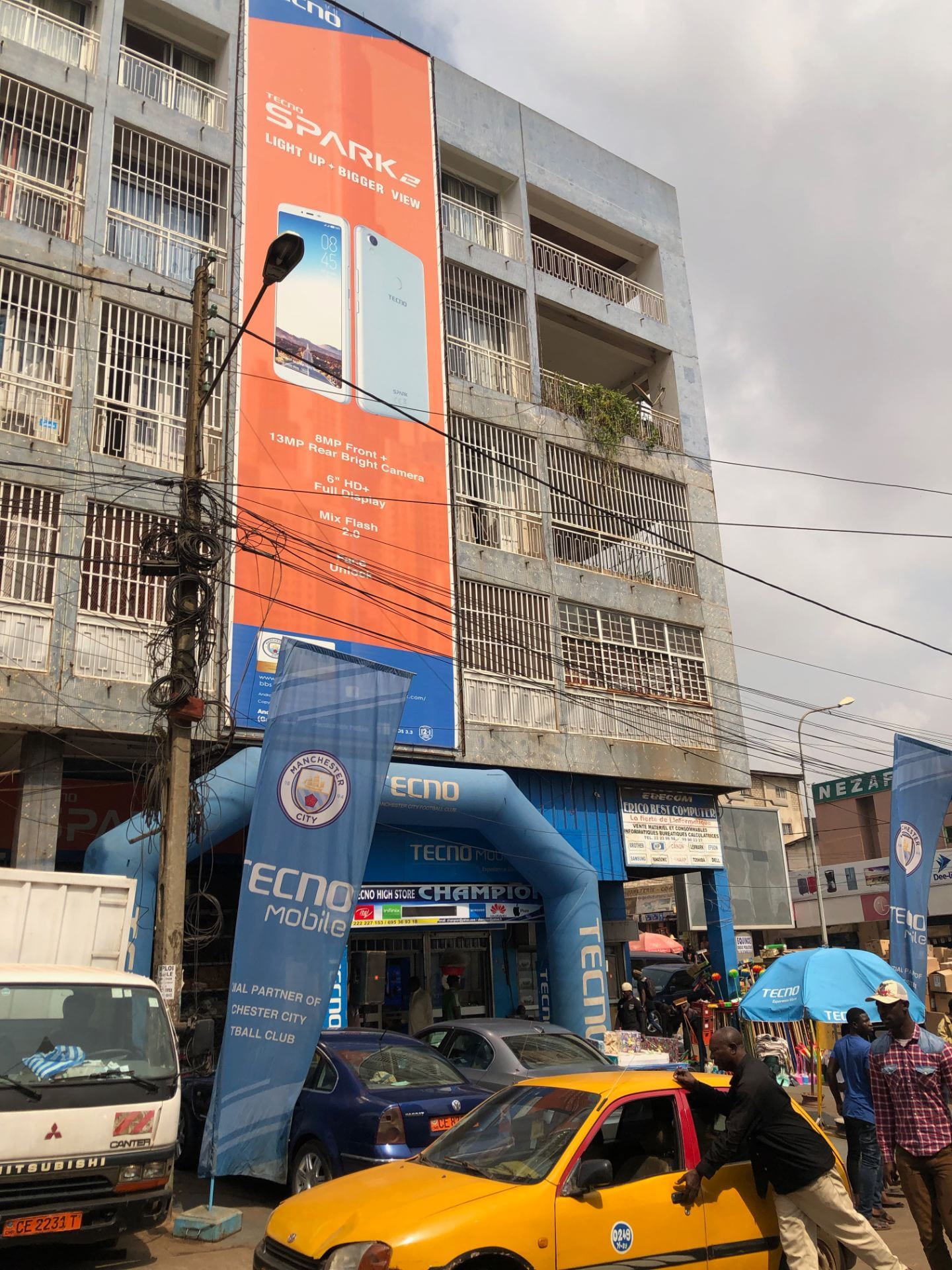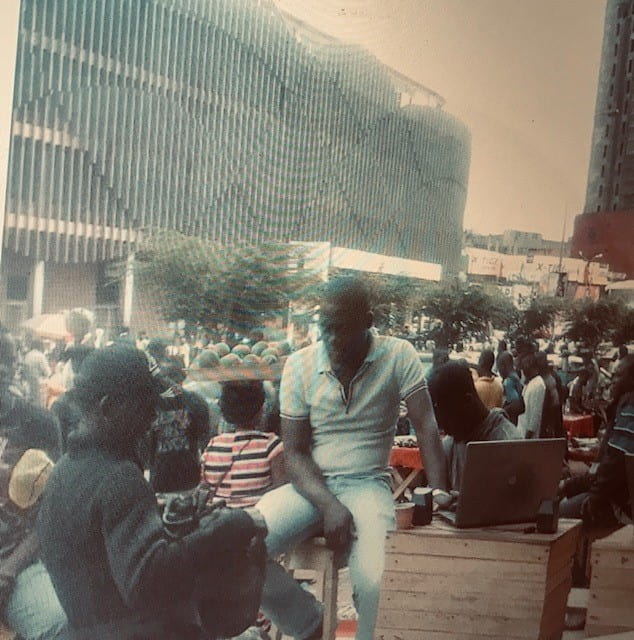COVID-19 in Cameroon: concurrent narratives and the battle for dignity
By p.awondo, on 11 May 2020
In Cameroon, the first case of Cov-2 SARS infection was published on the 6th of March, 2020. It involved a French-Cameroonian national who arrived in Cameroon through the airport of Yaoundé, the political capital, on the 24th of February. He was hospitalised and treated at the care centre of the Yaoundé Central Hospital. Today (the 9th of May, 2o20) Cameroon is, after Nigeria and Ghana, the country with the highest number of Covid-19 cases in sub-Saharan Africa: 2267 cases. Among these patients, 1019 have been cured and 108 have died. The first death occurred in Douala, the economic capital. The patient in question was a 63-year-old man who allegedly took in a woman from France and “escaped” quarantine.
The Cameroonian government had announced a number of measures in early March to stem the rapid spread of the pandemic. These measures were similar to those enacted in other African countries, with the closure of air, land and sea borders, partial confinement, the closure of schools and universities, partial closure of markets, bars and other places of worship, a ban on going out after 6 p.m., the mandatory wearing of masks in public spaces and other barriers such as systematic hand washing and disinfection of certain public places such as markets.
The epidemic of polemics and the reversal of stigma
As soon as the first case was announced, a certain psychosis had spread among the population. The presence of the macabre tally of the pandemic in European countries and particularly in France was so strong on social networks and other traditional media including television and the written press that people feared the worst.
Analysts and specialists on Africa were adding to the psychosis by predicting the worst.
In turn, UN Secretary-General Antonio Guterres and the WHO Secretary-General sounded the alarm by calling on African countries to “prepare for the worst”. While objectively feared because of a history of fairly recent epidemics (Ebola, cholera etc.), these various calls will also create controversy. Many African intellectuals will be outraged by the tone of these UN forums by recalling the condescension that was represented by the fact that they were being attacked by the media on a continent that remained relatively unscathed. On social networks, reactions were pouring in, all denouncing this “Western obsession with Afro-pessimism” which reflexively sees catastrophes in everything on the continent. Other commentators even question the announced health aid. In Cameroon, France’s announced support is viewed with suspicion. This policy of suspicion is exacerbated by a polemic on a video from a French news channel. The video excerpt in which two French doctors discuss the possibility of a vaccine against Covi-19 and in which one of them mentions the possibility of clinical and vaccine trials on the African continent goes viral. On social networks, the polemic is growing, African and Cameroonian intellectuals and public figures are taking a stand. In their substance, these interventions castigate the so-called “colonialist and paternalistic” dimension of French doctors’ statements. They are accused of wanting to impose a vaccine without respect for ethical standards on the continent. These facts are reminiscent of colonial medicine. The tribunes that will continue are the trial of a fixist vision of Africa and of the catastrophism dismissed by Western commentators of the beginning of the epidemic on the African continent.

This controversy, known as the vaccine controversy, is in addition to the controversy that arose when the first cases were announced in Cameroon. In the first week of the epidemic at the local level, the press relaying the moods of the population accused the diaspora of having imported the virus into the country. It is true that Cameroon, open to the world through its two largest cities Yaounde and Douala, saw the first cases from France land on its soil. The press and the communication coming from the Minister of Health will be harmful in terms of stigmatisation of the diaspora to the point where major media will end up opening the debate on the front page. By recalling the number of passengers disembarked on Cameroonian soil on a daily basis during the first two weeks, by stressing that among them there were positive cases, the ministerial communication did not only serve the need for public health, it also had the effect of stigmatising these “unwise travellers”, scapegoats of a dreadful epidemic which for once is imported from rich countries into the poorest like Cameroon. For a few weeks, the lynching in tabloids and on social networks of the local category known as “mbenguite” (travellers, migrants to Europe) became a stigma. This is a historical reversal in a context where “mbinguists” are often socially valued as providers of economic goods, seen as a resource due to to their migratory lifestyles. Potential carriers of Covid-19, mbinguists have become in Cameroon the paradigmatic repulsive figure of the reverse stigmatisation that took the “disease from Europe” to task.

The quest for medication and the return of African medicine
“In Congo-Brazzaville, covid-organics will soon be administered to the sick. A first shipment was received and symbolically handed over to Florent Ntsiba, chief of staff to President Denis Sassou-Nguesso. Other countries including Guinea-Bissau, Niger and Equatorial Guinea have already received their share of the treatment developed in Madagascar”. this excerpt could be read on the africanews.fr website on the morning of 10 May 2020.
To understand the circulation of this Malagasy potion, we have to go back a few weeks. Since the beginning of the epidemic, the quest for the drug has been ongoing. In French-speaking Africa, as in the rest of the world, the controversy around chloroquine is raging. In the local interpretation, the powerful lobbies of the world refuse to pay attention to the cheapest drug because the famous protocol of the French researcher Professor Didier Raoult already exists. On social networks and online media, users oppose the need to use or not to use the protocol of the one that the media call “the druid of Marseille”, in reference to the manufacturer of the Gallic magic potion in the famous comic book Astérix et Obélix.
The positions taken by Cameroonians on the Internet are similar to those taken by most Africans who are familiar with chloric acid and almost make Didier Raoult a hero.
As with every epidemic, the debate around the capacity of traditional African medicines is re-emerging. This time it is amplified by global controversies and the uncertainties of Western countries disoriented by the force of the virus.
On the 10th of April, Malagasy President Andry Rajoelina announced that Malagasy researchers have found a cure for Covid-19, “Today I am officially announcing here the successful and good results of the trials of our cure,” he said, “and it can be said that it has given a conclusive result on Covid-19 patients in Madagascar and that it can limit and mitigate its effects on the human body”. As the French online journal le Point points out, the controversy will start immediately. “The World Health Organization (WHO) has recognised that some traditional medicines and remedies “can alleviate the symptoms” of the coronavirus, but recalled that “there is no evidence that these substances can prevent or cure the disease”. The organisation even voted as early as 2007 for a resolution “calling for a phasing out of oral artemisinin-based monotherapies from the markets”. Artemisia is banned in several European countries”.

A meme that has been in circulation on Whatsapp groups, talking about standing ‘against’ the WHO, an organisation that ‘does not know Africa’.

Al Jazeera article on the Covid-Organics herbal remedy
In fact, from the very beginning of the pandemic, the African web was stirring with discussions about a local medical formula. Long before the first official case was even declared, many protocols for herbal teas, herbal potions and other so-called traditional barks were already circulating in Cameroon. This return of the traditional pharmacopoeia is accompanied by a militant pan-African discourse about “African solutions” and the “valorisation of the African pharmacopoeia”. A campaign that the Malagasy president will also take up during his many outings during which he values the African support of his fellow leaders as much as the orders already being shipped.
The quest for African medicine is thus becoming a pan-African militancy issue in an epidemic and pandemic context where the fatigue of being assisted by the West has been expressed. In the majority of comments, people react in support of this herbal tea and the WHO’s warnings are interpreted as a posture attributable to imperialism carried by an organisation that plays into the hands of the powerful and in particular the big global pharmaceutical groups.
In reaction to the WHO’s first comments on the issue, African countries such as Senegal are placing orders to Madagascar. On WhatsApp and Facebook, a small anti-WHO campaign is even taking shape, often featuring situations where African pharmacopoeia is used, with subtitles that are addressed directly to the WHO, as if to warn it against any hindrance to the use of African medicine.
The Malagasy herbal tea has also had the effect not only of taking the African world as a witness against the Western medical imperialism protected by the WHO (according to the polemicists) but also of freeing the actors who had hitherto on the continent intended to proceed in the same way.
Thus, in Cameroon, since the beginning of May, a polemic has been raging in the city of Douala since the Catholic Archbishop of Douala, who is a great adept of traditional pharmacopoeia, set up a potion. Advocating pharmaceutical nationalism, the archbishop is running a strong media campaign which has the active support of public figures (for example, he received 50 million XAF from a businessman), but also many Internet users. However, the medical system has been very cautious about taking these potions and any other form of traditional medication against Covid 19.
The quest for the medicine has thus become the quest for African dignity and its opportunity to rebuild its coat of arms in a world that sees it as the childhood of the world according to Hegel’s formula.


 Close
Close








